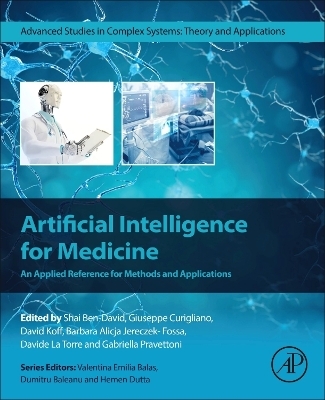
Artificial Intelligence for Medicine
Academic Press Inc (Verlag)
978-0-443-13671-9 (ISBN)
This book will be beneficial for academics, professionals in the IT industry, educators, students, and anyone else involved in the use and development of AI in the medical field.
Dr. Shai Ben-David earned his PhD in mathematics from the Hebrew University.?Over the years, he has been a Professor at the Technion, Haifa, Israel?and held visiting faculty positions at the Australian National University,?Cornell University, ETH Zurich, and TTI Chicago. His research interests span a range of topics including logic, theory of distributed computation, machine learning, and complexity theory. He routinely serves as a senior area chair in the major machine learning conferences (NeurIPS, ICML, AISTATS, COLT and ALT) and won best paper awards in COLT 2006, NeurIPS 2018 and ALT 2023. He is a co-author of a popular textbook "Understanding Machine Learning: From?theory to practice." Dr. Giuseppe Curigliano, MD PhD, is a Full Professor of Medical Oncology at the University of Milan and the Chief of the Clinical Division of Early Drug Development at European Institute of Oncology, Milan, Italy. Dr. Curigliano is an expert in the field of advanced drug development in solid tumors, with specific interest in breast cancer. He contributed to the development of many anticancer treatments currently available as standard of care in the treatment of multiple solid tumors. Dr Curigliano in 2022 was identified as Clarivate™ world’s most influential researchers. Dr Curigliano has contributed to over 670 peer-reviewed publications. Dr. David Koff, Professor Emeritus and past Chair of the Department of Radiology is the founder and director of MIIRCAM, the Medical Imaging Informatics Research Centre at McMaster University, where he oversees research initiatives on electronic transmission and workflow integration of medical images and AI applications in medical imaging. He co-developed the Canadian standards for lossy compression. He is a member of the IHE section of the RSNA's Medical Informatics committee and a co-founder of IHE Canada (Integrating the Healthcare Enterprise). Dr. Barbara Alicja Jereczek-Fossa is a Full Professor in Radiation Oncology at the University of Milan, Italy, and the Chair of the Division of Radiotherapy at the European Institute of Oncology, Milan. Her research expertise focuses on urological and breast malignancies, oligometastatic cancer, drug-radiation combinations and innovation in radiotherapy including proton therapy, stereotactic radiotherapy, AI and radiomics. Dr. Davide La Torre is a Full Professor in Applied Mathematics and Computer Science at SKEMA Business School in France. His areas of interest in research and instruction are Applied Mathematics, Artificial Intelligence, Mathematical Modeling, and Operations Research. He has previously held posts as a visiting and permanent university professor in Europe, Canada, the Middle East, Central Asia, and Australia. At various universities, he has held the positions of department chair and program director. He has contributed to more than 200 publications listed in Scopus. Dr. Gabriella Pravettoni is a Full Professor of Cognitive and Decision-Making Psychology at the University of Milan, where for several years she has been working on a new dimension of the doctor-patient relationship. She also serves as the Director of the Psycho-Oncology Division at the European Institute of Oncology, where she supervises clinical cases and develops and evaluates psychological treatments for cancer patients, putting the findings of several international research projects in which she is involved into clinical practice.
1. Artificial intelligence in cancer research and precision medicine
2. Machine learning in computational pathology through self-supervised learning and vision transformers
3. Artificial intelligence in small-molecule drug delivery
4. AI/ML and drug repurposing in lung cancer: State of the art and potential roles for retinoids
5. Artificial intelligence and digital worlds: New frontiers of integration between AI and other technological tools
6. The dual path of the technology acceptance model: An application of machine learning cardiotocography in delivery rooms
7. Artificial intelligence in diagnostic and predictive pathology
8. Artificial intelligence in the oncology workflow: Applications, limitations, and future perspectives
9. SOK: Application of machine learning models in child and youth mental health decision-making
10. Cancer detection in hyperspectral imagery using artificial intelligence: Current trends and future directions
11. Global research trends of Artificial Intelligence and Machine Learning applied in medicine: A bibliometric analysis (2012–2022)
12. Ethics and regulations for AI in radiology
13. The role of artificial intelligence in radiology and interventional oncology
14. The multiomics revolution in the era of deep learning: Allies or enemies?
15. Artificial intelligence in behavioral health economics: Considerations for designing behavioral studies
16. Artificial intelligence and medicine: A psychological perspective on AI implementation in healthcare context
17. AI for outcome prediction in Radiation Oncology: The present and the future
18. Artificial intelligence in neurologic disease
19. Should I trust this model? Explainability and the black box of artificial intelligence in medicine
| Erscheinungsdatum | 23.03.2024 |
|---|---|
| Reihe/Serie | Advanced Studies in Complex Systems |
| Verlagsort | San Diego |
| Sprache | englisch |
| Maße | 216 x 276 mm |
| Gewicht | 790 g |
| Themenwelt | Informatik ► Theorie / Studium ► Künstliche Intelligenz / Robotik |
| Informatik ► Weitere Themen ► Bioinformatik | |
| ISBN-10 | 0-443-13671-8 / 0443136718 |
| ISBN-13 | 978-0-443-13671-9 / 9780443136719 |
| Zustand | Neuware |
| Haben Sie eine Frage zum Produkt? |
aus dem Bereich


